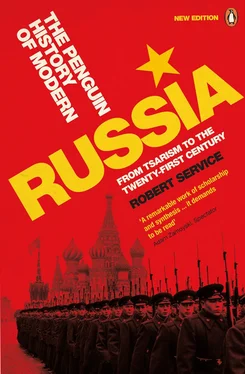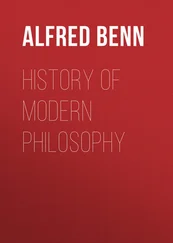Separation of Church from State, Decree on (1918), 90, 94
Serbia, 25
Sergei, Metropolitan ( later Patriarch), 135, 205, 282
Serov, General I.A., 276
Seven-Year Plan (1959), 351
Shaimiev, Mintimer, 539, 552
Shakhnazarov, Georgi, 450, 486
Shakhrai, Sergei, 512
Shakhty coal-mine (Don Basin), 175
Shalatin, Stanislav, 492–3
Shalyapin, Fëdr, 94
Shamil (Caucasus leader), 13, 316, 368
shares see capitalism
Shatalin, Stanislav, 492
Shatrov, Mikhail: Onward! Onward! Onward! , 450
Shchëkino Chemical Association, 408
Shcherbytskiy, Volodymyr, 403, 428, 457–8, 481
Sheboldaev, B.P., 213
Shelepin, Alexander, 365, 376, 379–80, 384, 390, 405
Shelest, Petro, 390, 403
Shenin, Oleg, 496, 498–9
Shepilov, D.T., 338, 344
Shevardnadze, Eduard: opposes nationalism, 391; succeeds Mzhavanadze, 391; and position of minorities, 424; Gorbachëv appoints Foreign Minister, 438, 512; in Politburo, 438, 456, 486; background and career, 439; supports Gorbachëv, 441, 464; and Eastern Europe, 463; resigns (1990), 493–4; warns Gorbachëv of coup, 496; at siege of Moscow White House, 501; Presidency of Georgia, 512
Shevchenko, Taras, 203, 368
Shkiryatov, M.F., 213
Shklovski, Viktor, 248
Shlyapnikov, Alexander, 118, 161
‘shock therapy’, 534
Shokhin, Alexander, 512
Sholokhov, Mikhail, 201
Short Course see Knorin, V.G. and others
Shostakovich, Dmitri, 249, 281, 319, 573
show trials: of Socialist-Revolutionaries (1922), 128; of Shakhty engineers (1928), 175; of ‘Industrial Party’ (1930), 185; of supposed nationalist opponents, 200
Shushkevich, Stanislav, 506
Sikhinova, Xenia (Miss World 2008), 559
Silaev, Ivan, 495, 500
Simonov, Konstantin, 284
Singing Together (pop duo), 558
Sinyavski, Andrei, 381, 390
Skobelev, Mikhail, 36–7
Skokov, Yuri, 512
Skoropadskyi, Hetman Pavlo, 84
Skrypnik, Mykola, 200
Slënsky, Rudolf, 311
slave labour see Gulag
Slavs, 283
Slivyak, Vladimir, 556
Slovaks, 103
Slutski, Boris, 191
Smirnov, A.P., 188
Smolensk, 136, 146, 261
Sobchak, Anatoli, 548
social acquiescence see acquiescence, social
social sciences, 419
Social Democratic Party (Germany) see German Social Democratic Party
Social-Democrats of Russian Empire see Russian Social-Democratic Workers’ Party
‘Socialism in One Country’, 156, 159, 177
Socialist Revolutionaries, Party of, 14–15, 19–20, 29, 35, 45–6, 48–9, 51–3, 58–9; anti-capitalism, 62–3; and October Revolution, 65–6; non-cooperation with Lenin’s 1917 government, 67; and land redistribution, 68; and Constituent Assembly election, 74, 81; excluded from Sovnarkom, 74; repressed by Bolsheviks, 93; flee to Samara, 101; Kolchak’s coup against, 106; excluded from soviets, 107; purged, 128, 185; denounced, 134; excluded from politics, 161; and opposition to Bolshevik Party, 188
socialists: co-operate with Provisional Government, 46; seek end to World War I, 51–2; demand radical change, 63; and Lenin’s ideas, 63–4, 529; anti-communist, 82
social welfare, 305, 406, 534, 558
Sokolnikov, Grigori, 78, 102
Sokurov, Alexander, 543
soldiers see armed forces; Soviet Army
Solidarity movement (Poland), 411
Soloukhin, Vladimir, 415; Reading Lenin , 478
Soloviev, Yuri, 473
Solovki island (White Sea), 478
Solzhenitsyn, Alexander, 224, 298, 366, 412–14, 476, 511; Cancer Ward , 381; The First Circle , 381; The Gulag Archipelago , 478; One Day in the Life of Ivan Denisovich , 365; after 1991, 544
Sorge, Richard, 259
South Korean airliner KAL-007, 432
South Osetiya, 560
Sovetskaya Rossiya (newspaper), 458, 497
Soviet Army ( formerly Red Army): rise to power, 85; formed, 101; in civil war, 103–4, 106, 110, 113, 116–17; Trotski organizes, 105–6; supplies, 109–10; officers, 112, 279; atrocities, 116; indiscipline, 119; invades Poland, 120–21, 126, 141; unrest in, 122; restores imperial boundaries, 128; used against peasants, 146; appointments to, 148; capital support for, 186; leaders purged, 220, 223, 225, 231, 236; rivalry with state organs, 233; nomenklatura in, 236; clashes with Japanese, 255; in Finnish winter war (1939–40), 257; and threat of German invasion, 259; campaigns in World War II, 261–9, 278; and defeat of Germany, 272; and war against Japan, 272–3; political commissars in, 279; rations, 279; political indoctrination in, 280–81; nationalities in, 283; World War II service in, 285–6; deserters and German collaborators, 287–8; experience of West, 297, 324; in Eastern Europe, 309, 481–2, 484; renamed, 323; Khrushchëv’s policy on, 346; Khrushchëv reduces, 372; power, 398; withdrawal from Afghanistan, 443; Gorbachëv reduces, 466; discontent with Gorbachëv regime, 480; quells unrest in Transcaucasia, 482; and unemployment, 518; see also Russian Army
Soviet of Workers’ and Soldiers’ Deputies, St Petersburg, 14, 35–6, 47
soviets: support Bolsheviks, 58; as alternative government, 60; and October Revolution, 62, 474; power under October Revolution, 69; size, 73; working-class apathy on, 83
sovkhozes (collective farms), 183, 224, 243, 350, 440, 470; see also collectivization
sovnarkhozy see regional economic councils
Sovnarkom see Council of People’s Commissars
Soyuz : formed (1990), 492–3, 497
Spain: economic improvement, 398
Spanish Civil War, 154, 230
Spanish Communist Party, 398
Spartacus, 93
Spartakists (Germany), 112
Special Transcaucasian Committee, 60
spies: anxiety over, 249–50
Spitak (Armenia): 1988 earthquake, 468
sport, 140, 191, 247, 357, 420–21; see also leisure and recreation
sputniks, 351
SS-20 missiles, 400
Stakhanov, Aleksei (and Stakhanovism), 217, 244
Stalin, Iosif: favours co-operation with Mensheviks, 47; supports Lenin’s plan to seize power, 61; aims to retain old empire, 69; relations with Lenin, 72, 151, 153, 196–7; and 1918 peace agreement, 77; aims for unitary state, 83; Georgian origins, 85, 195–6, 201, 315; antipathy to Trotski, 112; in Politburo, 112; federalism and republics, 114, 129–30, 132; and Georgian nationalism, 133; cultivates common touch, 142; opposes Trotski at 11th Party Congress, 151; as Party General Secretary, 151, 157; Lenin criticizes, 152, 174, 227, 339; and Lenin’s death, 153; and succession to Lenin, 154–5, 157, 197; attacks Trotski, 156; on ‘socialism in One Country’, 156, 159, 177; manner and methods, 157, 175, 315; defeats United Opposition, 160, 162, 164; discontinues NEP, 164, 172, 187, 190, 275; opposes higher agricultural prices, 164; hardens policies, 169, 171–6, 195; orders grain collection, 170, 172, 174; introduces first Five-Year Plan, 171–8, 182, 188, 190, 198–9; and industrial development, 175–6, 194, 234, 275–6, 329; foreign policy, 178; imposes collectivization, 179–82, 250; and Terror, 185, 210, 221–9, 231–2, 235, 250, 275, 340, 342; builds up defence capacity, 186; opposition to, 187–8, 193–4; view of Germany, 187; aims at personal dictatorship, 189; and material improvements, 192–4; background, career and character, 195–8, 226; and wife’s suicide, 195; personality cult, 198–200, 237, 250, 289, 315; accused of genocide, 202; and Soviet culture and identity, 205–8; reads historical works, 206; and Party’s power, 211–12; loses General Secretaryship at 17th Party Congress, 213–14; purges Party and armed services, 214–21, 223, 225, 231; supremacy, 219, 232–3, 238, 241–2, 314–15, 551; purges foreign communist parties, 229–31; intervenes in Spanish Civil War, 230; and totalitarianism, 235, 252–3; and communist theory and history, 237–9; introduces 1936 Constitution, 239–40; supporting network, 240–3; pressurizes subordinates, 244–5; and arts, 249; unpopularity, 250–51; and threat of World War II, 254–5, 259–60; pact with Nazis (1939), 255–6; and outbreak of World War II, 256–7; conciliates Hitler, 259; and German invasion, 260–61; and conduct of World War II, 262–6; considers separate peace, 268; meets Allied war leaders, 268–71, 273; relations with Allies, 269–70; and post-World War II European settlement, 270–72, 306–10; position at end of World War II, 273; orders wartime deportations, 276–7; World War II administration and concessions, 279–85; wartime concessions to Church, 281–2; hated by minority nationalities, 284; post-World War II repressive regime, 292–301; and Soviet-occupied Eastern Europe, 305–6; Tito criticizes, 310; militaristic foreign policy, 313; health decline, 314, 324; assumes Generalissimus title, 315; identifies with Russians, 315–17; chauvinism, 316–18; cultural views and interests, 317–20; ideological views, 321–3; life-style, 321; anti-Semitism, 324; at 19th Party Congress, 325–7; collapse, death and burial, 327–8, 330, 361; successors, 331–2, 376; denounced by Khrushchëv at 20th Party Congress, 338–42, 344, 360; appoints Brezhnev, 383; rehabilitation moves, 405; Gorbachëv on, 451, 454; Yakovlev criticizes, 459; economic rigidity, 550; ‘Dizzy with Success’, 180; The Economic Problems of Socialism in the USSR , 322; The Foundations of Leninism (lectures), 157–8; Marxism and Questions of Linguistics , 318, 322
Читать дальше












